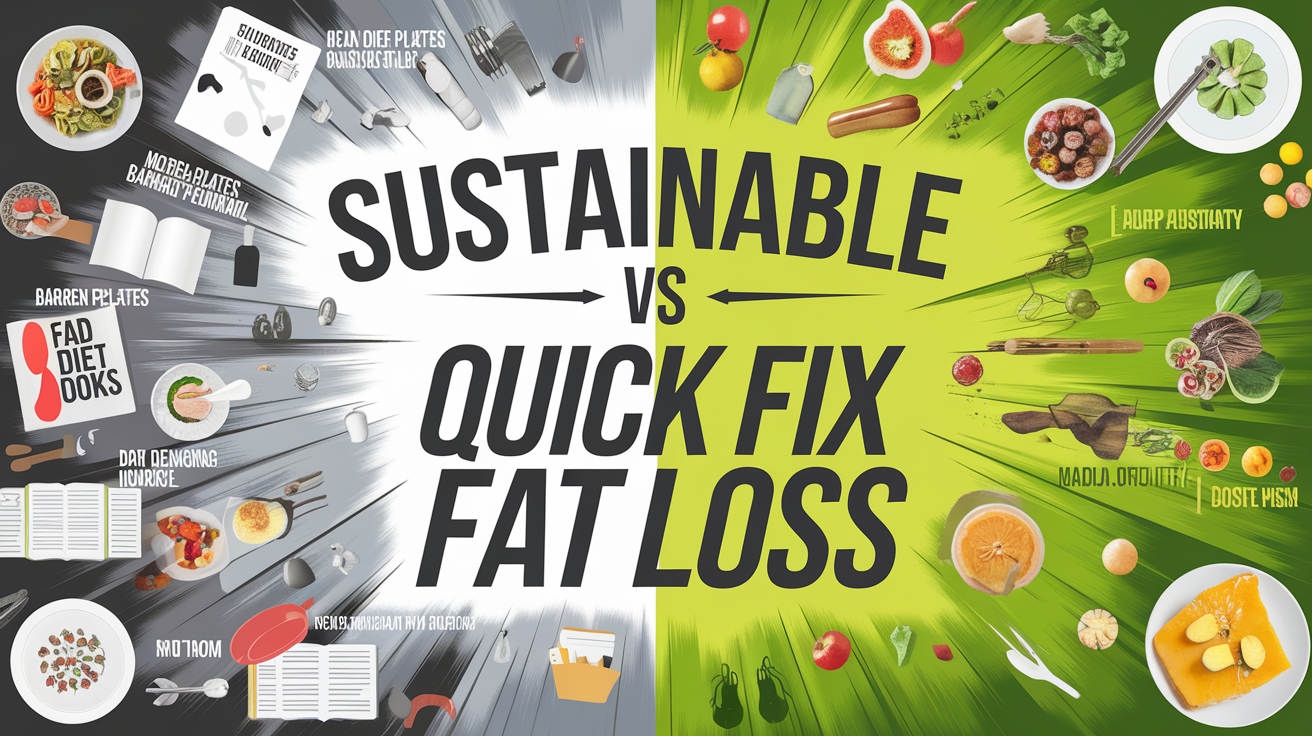Sustainable vs Quick Fix Fat Loss
Did you know many struggle to maintain their weight despite trying many diets? The appeal of quick fix fat loss is strong. They promise fast results with little work. Yet, these quick diets usually don’t support long-term success, leading to a cycle of weight gain and loss.
Stopping low-calorie diets can make the body go into ‘starvation mode.’ This triggers the weight to come back. This cycle of quick results followed by quick gains leads to disappointment. Sustainable vs quick fix fat loss isn’t only about the body. It involves mental and emotional health too.
This article looks at the key differences between these weight loss methods. It shows why it’s important to adopt changes that uphold health and lasting habits. True, lasting weight loss comes from flexible, healthy eating habits. This is how one achieves a lifestyle that lasts.
The Allure of Quick Fix Fat Loss
Many people are drawn to quick fix fat loss methods, enticed by the promise of fast results. We see dramatic before-and-after pictures on social media. They make us believe getting a perfect body overnight is possible. However, the truth is less glamorous. A healthier choice is to lose fat gradually without crash diets.
The Immediate Appeal
Quick diets seem exciting at first, offering a rush from seeing rapid weight loss. But this joy is often short-lived, making lasting change hard. Many fall into yo-yo dieting, cycling between strict dieting and going back to old eating habits. This leads to a difficult pattern of restrict and binge behavior.
- Many popular quick fix diets include extreme options like the Commando Diet, where dieters consume nine eggs daily.
- These diets often lead to nutrient deficiencies and negatively impact metabolism.
- Social lives can suffer as individuals isolate themselves during meals, fearing exposure to “forbidden” foods.
Common Quick Fix Diets
Quick fix diets are tempting with their promise of fast results but can be harmful. They push drastic changes in eating or severe calorie cuts, ignoring personal health. This can put health at risk.
- Fad diets frequently lead to temporary weight loss, usually consisting of water weight or muscle mass rather than fat.
- Trendy diets posted by influencers may be unreliable, promoting methods that might cause long-term health issues like nutrient deprivation and metabolic diseases.
- Sustainable weight loss is achieved through a gradual calorie deficit, emphasizing balanced nutrition and realistic dietary changes.
Sustainable vs Quick Fix Fat Loss
The battle between sustainable fat loss and quick fixes is like the tortoise and hare story. Choose the slow and steady route for lasting results or sprint down the quick path only to face inevitable setbacks. Understanding these two approaches can lead to long-term fat loss and healthy weight loss habits.
Understanding the Difference
Sustainable and quick fix fat loss strategies are quite different. Quick fixes, like extreme calorie cuts or fads, promise fast results. However, these gains come at a cost. Extreme measures may lead to rapid weight loss, but over 90% of people tend to regain that weight, often more. In contrast, sustainable methods may take longer—think April instead of next month—but they help develop lasting habits. Focusing on nourishing foods, flexibility, and enjoyment fosters a positive relationship with eating and exercise.
Long-term vs Short-term Results
Long-term fat loss strategies focus on gradual changes, establishing healthy habits that last. Studies show that people who follow very low-calorie diets tend to regain lost weight within 36 months. A sustainable approach, losing about 1-2 pounds a week, allows for better weight management over time. Choosing enjoyable foods and activities fosters success rather than struggle. Quick fixes often lack this aspect, leading to weight fluctuations that can kill motivation.

Health Risks of Quick Fix Diets
Quick fix diets may seem like the fast way to lose weight, but they come with big risks. These dangers can hurt both your mind and body. While everyone wants quick results, the bad effects of losing weight too fast can turn this hope into a problem.
Physical Consequences of Rapid Weight Loss
Rapid weight loss can lead to serious health problems, including:
- Nutrient deficiencies, which make it hard for your body to work right.
- Loss of muscle mass, making it tough to keep weight off in the long run.
- Fatigue and a weaker immune system, causing you to get sick more often.
- Problems thinking clearly because you’re not getting enough nutrients.
Studies show that diets with very few calories can cause more muscle loss than fat loss. This can make keeping the weight off even harder. It shines a light on the big risks of trying quick fix diets.
The Impact on Mental Health
Quick fix diets don’t just affect your body; they can harm your mental health too. They can lead to:
- Feeling like a failure when you can’t meet high expectations.
- More anxiety and depression from too much focus on food.
- A negative view of your own body due to stress over weight loss goals.
People on crash diets often get stuck in a bad cycle. They keep trying for fast results but end up unhappy with food and themselves. As Sarasota Laser Lipo points out, choosing a healthy and balanced way to lose weight is smarter. It helps you avoid the dangers of quick fix diets.

Benefits of Sustainable vs Quick Fix Fat Loss Strategies
Adopting sustainable fat loss strategies not only helps you reach your weight goals but also improves your food relationship. Instead of short-term diets, you’ll develop lifelong health habits. It’s all about healthy habits, not restrictions.
Building Healthy Eating Habits
With balanced meals and various food groups, you’ll start to love what you eat. You’ll see food as something good, not something to feel guilty about. This change reduces the urge for unhealthy snacks. Some smart steps are:
- Prioritizing whole, unprocessed foods
- Incorporating adequate protein to meet daily requirements (10% to 35% of calories)
- Ensuring sufficient fiber intake (28g for females, 34g for males)
- Mindful eating to foster connection with hunger cues
Long-term Weight Management
Long-term weight control is more achievable with sustainable methods. Taking small, steady steps helps you be more adaptive and resilient. Studies show that adopting these methods leads to:
- Improved mood and energy levels
- A healthier body composition
- Better metabolic health
The journey offers benefits beyond the scale. Engaging in structured programs helps in dealing with real-life challenges. It means enjoying gatherings without losing track of your goals. Resistance training is also a powerful tool to reduce body fat and keep you on track.

The Role of Exercise in Sustainable Weight Loss
Exercise is key for lasting weight loss success. Finding fun activities helps keep you moving. Dance, hike, or join a sports league to keep exercise interesting.
This way, you’ll stay motivated and consistent. And motivation is crucial for keeping an active lifestyle.
Finding Activities You Enjoy
Finding an exercise you love means it won’t feel like a chore. Here are some tips to find your best fit:
- Try different classes, such as Zumba, yoga, or martial arts.
- Explore outdoor activities like cycling, kayaking, or rock climbing.
- Participate in group events or sports leagues within your community.
Having fun with exercise lays the groundwork for long-lasting habits. Not every workout needs to be intense. A quick walk after meals helps too.
Maintaining an Active Lifestyle
An active life involves integrating movement into your day. Physical activity aids in weight loss and keeping muscle. Strive for 150 minutes of moderate cardio weekly, per the American Heart Association.
Intense workouts can be more efficient, requiring just 75 minutes a week. Consistency is crucial for weight management. Small actions, like using stairs or walking during breaks, help maintain activity.
People exercising 150 minutes a week see better weight loss. Even with ups and downs, regular exercise guarantees long-term success. It not only helps lose weight but also improves overall health.
Combining daily tasks with exercise makes for lasting change. For more on exercise and weight loss, check out this article.

Creating Sustainable Lifestyle Changes
Starting to make lasting changes in your life takes patience and a careful plan. Gradual progress is key to success. Think of it like growing a garden. It does better with steady care, not sudden moves. By taking small steps every day, you build up strength and belief in your new habits. This slow approach helps you feel proud, making big changes seem easier and avoiding the feeling of missing out.
Why Gradual Progress Works
True change happens slowly. Quick fixes, like fast weight loss, often don’t last because they mostly reduce muscle and water weight, not fat. Going slow allows your body to adjust properly. It sets you up for long-term success. Plus, this way, you enjoy the process more by doing fun activities like walking, yoga, or playing sports. This avoids the burnout or injuries that can come from too much too soon.
Setting Realistic Goals
Making real change means setting goals that you can actually reach. Rather than aiming for big weight loss quickly, focus on smaller steps. Try losing one to two pounds per week. This plan boosts your drive and teaches patience. Remember, progress can be uneven. It’s important to stay positive and flexible. Being kind to yourself helps keep you going, even when it gets tough.

To get more ideas on making weight management work for you, look at more tips on sustainable lifestyle changes. Using these strategies can help you build healthy habits that last and improve your overall health.
Breaking the Cycle of Yo-Yo Dieting
Yo-yo dieting can be a real struggle. Ever lost five pounds then gained back seven? This back-and-forth isn’t just hard on your scale. It also harms your mind and body. Learning why you’re stuck in this cycle helps you manage your weight better.
Yo-yo dieting comes with big problems. It can lead to unhealthy eating, low self-esteem, and a tough time with food. It also ups the risk of serious health issues like heart problems, especially for women. Going through weight loss and gain can even slow down your metabolism, making it hard to stay at a healthy weight.
Breaking free is key. Try flexible eating and aim for slow, lasting changes. A good relationship with food means balance, not harsh rules. Maybe keep an eye on what you eat or talk to a nutritionist. The goal? Not just losing weight, but living healthier for good.
- Macronutrients and Fat Loss: Optimizing Your Diet - January 19, 2025
- Top Fat Loss Tools for Effective Weight Management - January 19, 2025
- Setting Achievable Realistic Fat Loss Goals - January 18, 2025
